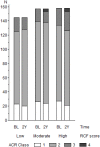Rational/antiemotional behaviors in interpersonal relationships and the functional prognosis of patients with rheumatoid arthritis: a Japanese multicenter, longitudinal study
- PMID: 24565416
- PMCID: PMC3941968
- DOI: 10.1186/1751-0759-8-8
Rational/antiemotional behaviors in interpersonal relationships and the functional prognosis of patients with rheumatoid arthritis: a Japanese multicenter, longitudinal study
Abstract
Background: The repression of negative emotions is a personality factor that received considerable attention in the 1950-60s as being relevant to the onset and course of rheumatoid arthritis (RA). Despite subsequent, repeated criticisms of the cross-sectional nature of the earlier studies, even to date few prospective studies have been reported on this issue. This multicenter study prospectively examined if "rational and antiemotional" behavior (antiemotionality), characterized by an extreme tendency to suppress emotional behaviors and to rationalize negative experiences in conflicting interpersonal situations, is associated with the functional prognosis of patients with RA.
Methods: 532 patients with RA who regularly visited one of eight hospitals/clinics in Japan in 2000 were recruited for study. All completed a self-administered baseline questionnaire about lifestyle and psychosocial factors including antiemotionality. Two years after, 460 (mean age, 56.1 years; 54 men and 406 women) of 471 patients who continued to visit the clinics agreed to take the follow-up questionnaire. The functional status of the patients was evaluated by rheumatologists based on the ACR classification system.
Results: A multiple logistic regression model that included baseline demographic, disease activity/severity-related, therapeutic, and socioeconomic factors as covariates found a tendency toward higher antiemotionality to be related to poorer functional status at follow-up. This relationship was not explained by lifestyle factors.
Conclusions: Antiemotionality may be a prognostic factor for the functional status of patients with RA. This finding sheds light on a seemingly forgotten issue in the care of patients with RA.
Figures

Similar articles
-
Life events, emotional responsiveness, and the functional prognosis of patients with rheumatoid arthritis.Biopsychosoc Med. 2015 Jun 23;9:15. doi: 10.1186/s13030-015-0043-3. eCollection 2015. Biopsychosoc Med. 2015. PMID: 26106442 Free PMC article.
-
Development and application of a questionnaire to assess patient beliefs in rheumatoid arthritis and axial spondyloarthritis.Clin Rheumatol. 2018 Oct;37(10):2649-2657. doi: 10.1007/s10067-018-4172-5. Epub 2018 Jun 12. Clin Rheumatol. 2018. PMID: 29948351 Free PMC article.
-
Health care and burden of illness in systemic lupus erythematosus compared to rheumatoid arthritis: results from the National Database of the German Collaborative Arthritis Centres.Lupus. 2004;13(7):529-36. doi: 10.1191/0961203304lu1054oa. Lupus. 2004. PMID: 15352425
-
Assessing prognosis and prediction of treatment response in early rheumatoid arthritis: systematic reviews.Health Technol Assess. 2018 Nov;22(66):1-294. doi: 10.3310/hta22660. Health Technol Assess. 2018. PMID: 30501821 Free PMC article.
-
Short-term outcomes in recent-onset rheumatoid arthritis.Br J Rheumatol. 1995 Nov;34 Suppl 2:79-86. Br J Rheumatol. 1995. PMID: 8535654 Review.
Cited by
-
Life events, emotional responsiveness, and the functional prognosis of patients with rheumatoid arthritis.Biopsychosoc Med. 2015 Jun 23;9:15. doi: 10.1186/s13030-015-0043-3. eCollection 2015. Biopsychosoc Med. 2015. PMID: 26106442 Free PMC article.
References
-
- Scharloo M, Kaptein AA, Weinman JA, Hazes JMW, Breedveld FC, Rooijmans HGM. Predicting functional status in patients with rheumatoid arthritis. J Rheumatol. 1999;8(8):1686–1693. - PubMed
LinkOut - more resources
Full Text Sources
Other Literature Sources

